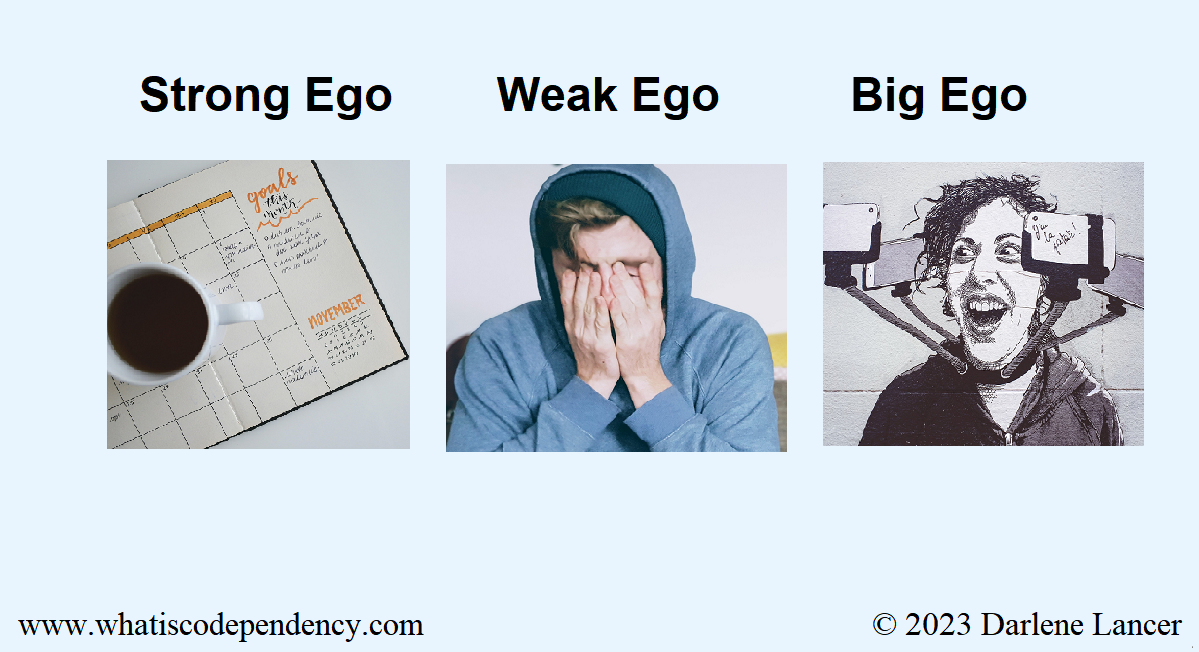 The term “ego” has a bad rep, but in fact, having a strong ego indicates mental health in contrast to a weak or big ego. In Freud’s structural model of the psyche, “I” was translated to the Latin, “ego.” Unlike the primitive “id” seen in infants, the ego develops in stages and represents the “reality principle.” It delays gratification and mediates the id’s wants, emotions, and instinctual drives with reality. Its functions are control, judgment, tolerance, reality testing, planning, defense, memory, synthesis of information, and intellectual functioning.
The term “ego” has a bad rep, but in fact, having a strong ego indicates mental health in contrast to a weak or big ego. In Freud’s structural model of the psyche, “I” was translated to the Latin, “ego.” Unlike the primitive “id” seen in infants, the ego develops in stages and represents the “reality principle.” It delays gratification and mediates the id’s wants, emotions, and instinctual drives with reality. Its functions are control, judgment, tolerance, reality testing, planning, defense, memory, synthesis of information, and intellectual functioning.
The conscience or super-ego, evident around 5 years old, is idealistic and perfectionistic. It absorbs rules and standards from our parents, other authority figures, religion, and culture. When it becomes demanding, critical, or punishing it’s often referred to as your “inner critic.”
A Strong Ego
People with a strong ego see themselves and reality objectively and respond to others and life realistically. A strong ego socializes us, facilitates the exercise of our will, and anticipates, remembers, and plans for the future. Knowing and respecting oneself, such a person respects others and can establish protective boundaries. In sum, it modulates the demands of the world, our passions, and the restrictions of our super-ego. To reduce this tension and accompanying anxiety, it employs defense mechanisms, such as denial, repression, sublimation, rationalization, splitting, projection, and more.
People with strong egos have confidence, emotional intelligence, and common sense. They both experience and manage their emotions and can find solutions to life’s problems. Rather than react, they have a defined sense of self and are resilient to life’s challenges. Using their intellect they can foresee consequences, and with self-discipline, they can pursue and accomplish goals.
A Weak Ego
An undeveloped or weak ego may be due to dysfunctional parenting that is oppressive, abusive, invasive, or neglectful. Someone with a weak ego is easily overwhelmed by the demands of the id, other people, and life’s problems. They have difficulty controlling their id impulses. When confronted with difficulties, they may give up and escape through fantasy or addiction, denial of problems, cognitive distortions of reality, or wishful thinking. They may seek authority figures or a partner to rescue them. Codependents often have weak egos and can lose their identity in relationships. They’re easily swayed by others, seek their approval, and self-sacrifice for them. They idealize and are easily impressed and manipulated by someone with a big ego, like a narcissist.
A Big Ego
A big ego is really a false, manufactured ego. Rather than relating to reality and moderating the demands of the id and super-ego, a person with a big ego creates an imaginary world wherein they’re impervious to the exigencies of life. Like a narcissist, they’re grandiose and concoct false memories. As a consequence, they react based on impulse and false beliefs and can’t learn from experience. On the one hand, they give in to the impulses of their id, and on the other, they identify with the ideals of the super-ego.
A big ego imagines itself to always be right, flawless, needless, and superior to others. It lacks boundaries and understanding. Because this grandiose ego is fabricated and not related to reality, it can’t take criticism and has difficulty cooperating and accepting help, rules, or boundaries. A person with a big ego is empty. For supply and validation, they focus on other people whom they must control. They do this using tactics like impression management, bragging, covert manipulation, and intimidation. They must deny or hide mistakes and easily succumb to shame. Because they lack normal ego functions, they’re fragile, rigid, and not resilient. Failure is not an option.
Strengthen your ego by overcoming codependency with Codependency for Dummies, the Narcissist Quit Kit and Dating, Loving, and Leaving a Narcissist: Essential Tools for Improving or Leaving Narcissistic and Abusive Relationships.
© Darlene Lancer 2023
